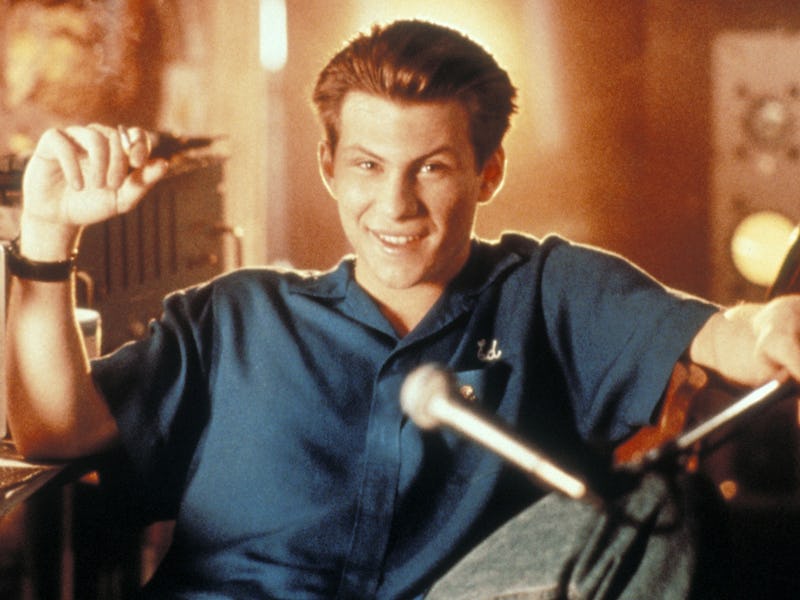Talking Hard And Stealing the Air | A Look Back On 'Pump Up the Volume' 25 Years Later
Hard talk from Christian Slater circa 1990.

“You ever get the feeling that everything in America is completely fucked up?” asks antihero DJ Happy Harry Hard-On in the opening voiceover of Pump Up the Volume. It was a purposefully expletive-rife question designed to wake the inner rebel within every American boy born in the late 80s. Now, 25 years later, its a note-perfect introduction to the era of teenage dramatics.
The work of writer-director Allan Moyle, Pump arrived in the summer of 1990 with little pre-release hype, a reactionary antithesis to the film’s central message: take a stand, be the change, and on the whole, damn the man. It tells the story of Mark Hunter, an unassuming, self-confessed nerd whose parents relocate from the East coast to a bland (as he calls it, “whitebread”) Arizona suburb. They palm him off with a shortwave radio to keep in touch with old friends back East. He uses it to host a pirate radio station under the monicker Hard Harry - or Happy Harry Hard-On. Through his broadcasts he exposes the underhand tactics of his high school principal while debating the struggles of being a teenager.
Rewatching the movie with an eye to penning this piece, the glaring hallmarks of its era border on distracting; the lumberjack fashion on the cusp of grunge, outdated technology, and gestures of rebellion could only hail from the early ‘90s. Its message of embracing who you are is still a go-to subtext for mainstream cinema that’s now met with a tiresome yawn because yeah, yeah, we know. Be ourselves, everything will work out fine. Separate the awful tropes of early Gen X culture from that maxim and the message still applies. Life in America is fucked-up.
Likewise, Hunter’s Hard Harry persona has stayed relevant. He’s crude and juvenile. Reels of fart sounds are readily cued-up, and he frequently trolls listeners with explicit fake masturbatory paroxysms:
… while being insightful and self-aware. He occupies the spaces a contemporary teen movie would divide between two characters: gross-out clown and the well-read, smart guy.
Harry confronts his listeners from a place of anonymous freedom only afforded to him because he’s hiding behind a voice changer and endless waves. At the time of release, Christian Slater carried around the ‘Jack Nicholson of his generation’ tag, and it’s hard to imagine anyone other than he bringing that boundless energy, like a reality runoff, to the part of Harry.
Certain plot contrivances allow him to take down the school, namely his dad’s role as school commissioner. It’s a bit convenient, one of the film’s many moments when urgency to forward the narrative overrides things, but a forgivable offense. It’s here where Pump truly excels; Harry’s ultimate plan to thwart the corruption at his high school. His call to arms (“Talk hard!”) is seen as a stunt by parents, teachers, and even the FCC to encourage a youth uprising, when all he wants is to watch the implosion of an educational system that’s failed its students. It’s an issue — of a Principal who takes government funding then expels those who score lowest on the SATs — that continues to make waves today.
Yeah, that's Teen Wolf's dad.
What stands out most as the film draws to a close is the difference a quarter of a century has made to Moyle’s script. A document that, today, would crumble beneath the ink of all the modern updates. A pirate radio station is child’s play compared to the plethora of broadcasting options available now. And that’s the great conceit underpinning the entire film: Mark Hunter does have something to say, and he’s self-motivated enough to school up on the electronic basics required to run his covert operation in his parents’ basement. In 2015 the movie would fail miserably. You no longer need something to say. No specialty is required to live stream via Periscope, to host podcasts or start a YouTube channel. The digital age is flooded with more methods for closing the gap between our personal and public selves. Anyone with half a brain can get their message out there, whether or not it has purpose or spirit.
Harry’s rambling half-cooked shows spread an honest, if albeit hokey, desire to rise up and take command of life. He reaches his audience, a small homespun base of likeminded high schoolers perviously unable to connect to one another. Boom boxes spring up all over campus blasting the latest Hard Harry show. Kids dance around them in a one-fingered salute to their oppressors. Yeah, it’s uber-cheesy like most of the ker-RAZY things the students get up to, and yet they’re united to become more pro-active. In the flesh, not on Internet forums or message boards.
Watching it again, many years after I first discovered it as a teenager, Harry’s observations struck a nerve because I recall how they struck a nerve back then. Some form of forced nostalgia perhaps, I don’t know. That same sense of isolation no longer haunts me anymore nor the need to scrawl his aphorisms across my journal. But he was right, though. All the pain and misery of high school (or secondary school as it was for me, a Brit) makes you a better human being for surviving it.
It’s heart-warming, heavy-handed at times, and it kinda cops out a little towards the end, but that’s Hollywood. Pump Up The Volume still has something to say. To the naysayers, I say fuck it.